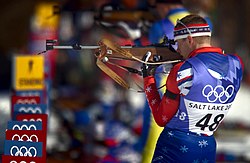| Biathlon at the XIX Olympic Winter Games | |
|---|---|
 Andrea Nahrgang competing at Soldier Hollow at the 2002 Winter Olympics. | |
| Venue | Soldier Hollow |
| Dates | 9–20 February |
| No. of events | 8 |
| Competitors | 190 from 34 nations |
| Biathlon at the 2002 Winter Olympics | ||
|---|---|---|
 | ||
| Individual | men | women |
| Sprint | men | women |
| Pursuit | men | women |
| Relay | men | women |


Biathlon at the 2002 Winter Olympics consisted of eight biathlon events. They were held at Soldier Hollow. The events began on 11 February and ended on 20 February 2002. [1] For the first time since 1992, the biathlon program expanded. A new race type, the pursuit (for both men and women) was added, the first new race type since the debut of the sprint in 1980. [2]